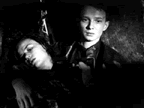Four people emerge from the austere horizon, heading for the shore of a seemingly desolate island: a successful writer, David (Gunnar Bjornstrand), his adolescent son, Minus (Lars Passgard), his fragile daughter, Karin (Harriet Andersson), and Karin’s husband, Martin (Max von Sydow). Surrounded by her family, Karin is brought to the remote island in order to facilitate her recuperation from a nervous breakdown. But it is soon evident that her family is so consumed by their own frailties and self-absorption that they are impotent to prevent a psychotic relapse. David studies her with a clinical detachment of a psychological experiment. Martin’s medical training proves ineffectual as he attempts to alleviate her anguish by consenting to her delusions. Minus is preoccupied with his own sexual awakening, and sees Karin as a convenient insight into the female psyche. Like most Bergman films, Through a Glass Darkly is a portrait of loneliness and alienation. Note the perfectly framed, shattering scene where David cries uncontrollably upon realizing how distant he and his children have grown. Another is Minus’ plea to God as he retrieves a blanket for Karin. As in Krzysztof Kieslowski’s Red, emotional honesty is revealed in moments of isolation.
Through a Glass Darkly is the first film of Ingmar Bergman’s religious chamber trilogy, influenced by the minimal instrumentation of chamber music. The film is visually spare, stark, and metaphoric. Note Karin’s disintegration inside the hull of a shipwreck, symbolizing the tormented soul. It is a brooding, highly personal film that seeks validation for Bergman’s religious upbringing and the essence of God. David tells Minus: “I don’t know if love proves God’s existence, or love is God Himself.” In the end, Karin sees God behind the attic door – and it is a cold, stony faced spider – a painful reflection of her own family’s deceptive love: a false god.
© Acquarello 1999. All rights reserved.
